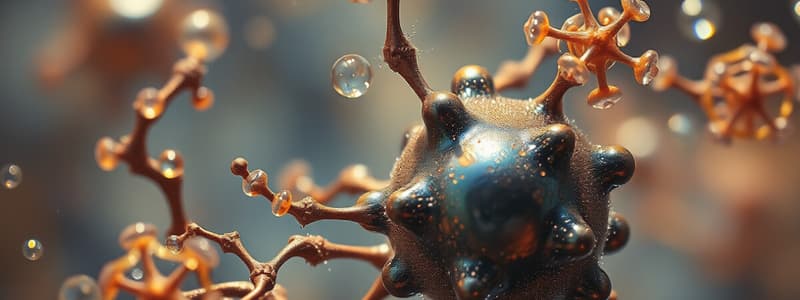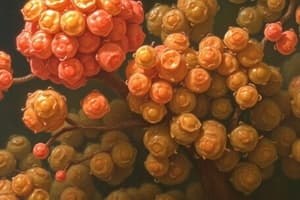Podcast
Questions and Answers
What occupies the volume of both prokaryotic and eukaryotic cells?
What occupies the volume of both prokaryotic and eukaryotic cells?
- Ribosomes
- Nucleus
- Organelles
- Cytoplasm (correct)
Which of the following is a membrane-bound organelle found in eukaryotic cells?
Which of the following is a membrane-bound organelle found in eukaryotic cells?
- Ribosome
- Chloroplast (correct)
- Mitochondria (correct)
- Centrosome
Which organelle helps in cell division in animal cells?
Which organelle helps in cell division in animal cells?
- Golgi complex
- Cytoplasm
- Centrosome (correct)
- Mitochondria
What distinguishes prokaryotic cells from eukaryotic cells regarding organelles?
What distinguishes prokaryotic cells from eukaryotic cells regarding organelles?
Where are ribosomes typically found within a eukaryotic cell?
Where are ribosomes typically found within a eukaryotic cell?
What is the main focus of Reductionist Biology?
What is the main focus of Reductionist Biology?
What notable structure did G.N. Ramachandran discover?
What notable structure did G.N. Ramachandran discover?
Which of the following techniques is associated with G.N. Ramachandran?
Which of the following techniques is associated with G.N. Ramachandran?
Where did G.N. Ramachandran complete his Ph.D.?
Where did G.N. Ramachandran complete his Ph.D.?
On which date was G.N. Ramachandran born?
On which date was G.N. Ramachandran born?
Which figure influenced Ramachandran during his time at Cambridge?
Which figure influenced Ramachandran during his time at Cambridge?
What did Ramachandran study in relation to biopolymers?
What did Ramachandran study in relation to biopolymers?
At what age did G.N. Ramachandran pass away?
At what age did G.N. Ramachandran pass away?
What role does the quasi-fluid nature of lipids play in the plasma membrane?
What role does the quasi-fluid nature of lipids play in the plasma membrane?
Which transport mechanism does not require energy?
Which transport mechanism does not require energy?
What is the process called when water moves across a membrane from higher to lower concentration?
What is the process called when water moves across a membrane from higher to lower concentration?
Which statement correctly describes active transport?
Which statement correctly describes active transport?
What is one of the primary functions of the plasma membrane?
What is one of the primary functions of the plasma membrane?
What helps polar molecules to pass through the nonpolar lipid bilayer of the membrane?
What helps polar molecules to pass through the nonpolar lipid bilayer of the membrane?
Which feature characterizes cell walls in fungi and plants?
Which feature characterizes cell walls in fungi and plants?
What is a primary role of the fluid nature of the plasma membrane in cellular functions?
What is a primary role of the fluid nature of the plasma membrane in cellular functions?
What is the primary function of cilia in cells?
What is the primary function of cilia in cells?
What structural arrangement do the microtubules in the axoneme of cilia and flagella exhibit?
What structural arrangement do the microtubules in the axoneme of cilia and flagella exhibit?
What distinguishes prokaryotic flagella from eukaryotic flagella?
What distinguishes prokaryotic flagella from eukaryotic flagella?
How are the central tubules connected in the axoneme?
How are the central tubules connected in the axoneme?
What is the role of the basal bodies in relation to cilia and flagella?
What is the role of the basal bodies in relation to cilia and flagella?
What type of arrangement do centrioles have within a centrosome?
What type of arrangement do centrioles have within a centrosome?
What component links the triplet peripheral fibrils in centrioles?
What component links the triplet peripheral fibrils in centrioles?
What is the composition of the hub located in the proximal region of each centriole?
What is the composition of the hub located in the proximal region of each centriole?
What are the roles of centrioles in animal cells?
What are the roles of centrioles in animal cells?
Who first described the nucleus as a cell organelle?
Who first described the nucleus as a cell organelle?
What is chromatin composed of?
What is chromatin composed of?
What does the nuclear envelope do?
What does the nuclear envelope do?
What is the function of nucleoli within the nucleus?
What is the function of nucleoli within the nucleus?
What is the perinuclear space?
What is the perinuclear space?
What keeps the outer membrane of the nuclear envelope continuous?
What keeps the outer membrane of the nuclear envelope continuous?
Which component does NOT belong to the structure of the nucleus?
Which component does NOT belong to the structure of the nucleus?
Flashcards are hidden until you start studying
Study Notes
Reductionist Biology
- A physico-chemical approach used to study and understand living organisms through concepts and techniques from physics and chemistry.
- Biomolecules are briefly described in Chapter 9 of the referenced unit.
G.N. Ramachandran
- Founder of the 'Madras school' of conformational analysis of biopolymers.
- Known for discovering the triple helical structure of collagen in 1954; published findings in Nature.
- Developed the 'Ramachandran plot' for analyzing allowed protein conformations.
- Born on October 8, 1922, near Cochin, India; significant early influence from his father, a mathematics professor.
- Graduated top of his class in B.Sc. (Honors) Physics from the University of Madras in 1942.
- Earned a Ph.D. from Cambridge University in 1949; influenced by Linus Pauling's work on protein structures.
- Passed away on April 7, 2001, at the age of 78.
Cytoplasm and Cell Structure
- Cytoplasm is a semi-fluid matrix occupying cell volume in prokaryotic and eukaryotic cells, serving as the main site for cellular activities.
- Eukaryotic cells contain organelles (e.g., endoplasmic reticulum, Golgi complex, lysosomes, mitochondria) which are not found in prokaryotic cells.
- Ribosomes, non-membrane bound organelles, are present in all cells, located in the cytoplasm, chloroplasts (plants), mitochondria, and rough ER.
- Animal cells additionally possess centrosomes, which assist in cell division.
Plasma Membrane Dynamics
- The fluid nature of the plasma membrane enables protein movement, crucial for functions like growth, secretion, and cell division.
- Plasma membranes are selectively permeable, allowing some molecules to traverse without energy (passive transport).
- Neutral solutes and water pass through the membrane via simple diffusion and osmosis, respectively.
- Polar molecules require carrier proteins for transport across the lipid bilayer.
- Active transport involves moving ions or molecules against their concentration gradient using ATP, like the Na+/K+ pump.
Cell Wall and Locomotion Structures
- The cell wall provides a rigid outer covering for plant and fungal cells, offering shape, protection, and facilitating cell-to-cell interactions.
- Cilia and flagella enable cell movement; cilia are short and oar-like, flagella are long and whip-like.
- Prokaryotic and eukaryotic flagella differ structurally, both covered by plasma membrane with an axoneme structure (9+2 arrangement of microtubules).
Centrosome and Centrioles
- The centrosome contains two centrioles arranged perpendicularly, each made up of nine peripheral triplets of tubulin.
- Centrioles are involved in forming the basal body of cilia/flagella and spindle fibers during cell division.
Nucleus Structure
- Robert Brown first described the nucleus in 1831; chromatin (nuclear material) was later identified by Flemming.
- Interphase nucleus features nucleoprotein fibers (chromatin), nucleoplasm, and nucleoli.
- The nuclear envelope comprises two membranes, creating a perinuclear space (10 to 50 nm) that separates nuclear content from cytoplasm, and is continuous with the endoplasmic reticulum.
Studying That Suits You
Use AI to generate personalized quizzes and flashcards to suit your learning preferences.



